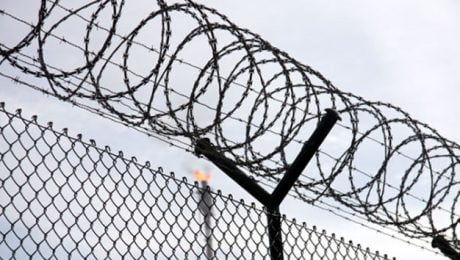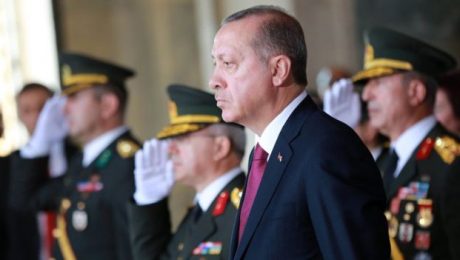Keyword: Freedoms

Alleged Gülen sympathizers in prison banned from communication with outside world
The İstanbul Chief Public Prosecutor’s Office has prohibited individuals in Silivri Prison who are currently under arrest over their alleged links to the faith-based Gülen movement from communicating with the outside world during an ongoing state of emergency, the Sözcü daily reported on Monday.

Council of Europe warns against hate speech by senior state officials in Turkey
The human rights body of the Council of Europe, the Commission against Racism and Intolerance, issued a report on Wednesday about the increasing use of hate speech, even by senior state officials. While President Recep Tayyip Erdoğan called the Gülen sympathizers “viruses,” Prime Minister Binali Yıldırım labeled them microbes. The movement is the main target of a massive purge and witch-hunt in Turkey.

Escape from Turkey’s parallel reality
As a law-abiding citizen, I knew I had done nothing wrong to be stopped at the border. But in Turkey being a journalist from Zaman media group was enough for me to be considered an “enemy of the state.” And I was the editor-in-chief of Today’s Zaman which had been brutally taken over a few days earlier, earning me a suspended jail sentence for my tweets criticizing then-Prime Minister Ahmet Davutoğlu.

Turkish Prisons Are Filled With Professors — Like My Father
A Turkish professor who was my father’s colleague and frequently visited our house is now incapable of counting right amount of money to pay for a bottle of water at a prison canteen. He is traumatized as a result of days of harsh treatment during the interrogation. He is sharing a prison cell with my father, longtime friends, in western Turkey.

Faces of Manisa prisoners rendered unrecognizable due to torture, lawyer says
The faces of people held in a Manisa prison have become unrecognizable due to heavy torture, Seda Tanrıkulu, a lawyer representing some of the prisoners, told the Turkish media. “When I met with prisoners, there were bruises on the face of D.K., made by the boots of officials,” Tanrıkulu said.

Twitter shouldn’t let itself become a tool for tyrants
Journalists have been in Mr. Erdogan’s crosshairs, and his campaign is pushing into the digital universe, too. Turkey is pressing Twitter to silence journalists, and Twitter must resist more vigorously. Twitter is a powerful force for free expression. “The tweets must flow,” the company likes to say. But they don’t always flow, as freedom of speech and democracy are in retreat around the globe.

Turkey post-coup purges convulse society
President Erdogan says the state of emergency might be needed for another year to crush the “terrorist” threat. More than 130 media outlets have been shut down, the pro-Kurdish IMC TV the latest victim. The authorities have started releasing 38,000 prisoners, to make way for the new arrests.

Did Turkey Really Save Democracy On July 15?
The government is yet to renovate that place, preserving the area for foreign delegations as a showcase for the savagery of putschist soldiers. Ankara makes sure that every visiting foreign official is making their pilgrimage to the site, through dust and scattered rocks, so that they see firsthand how the mutineering soldiers attacked the Turkish democracy.

Crackdown on journalists leaves void in post-coup Turkey
That is down in large part to the gutting of Turkey’s independent press. More than 115 journalists have been imprisoned and hundreds more fired since the July 15th coup attempt, while 130 media outlets have been shuttered. That, in addition to the sacking of more than 1,000 media workers in the previous 12 months, has left crucial questions unanswered. Put simply, there is no one left – or willing – to overturn the stones on which the failed military takeover was built.

Turkey as a “serial” human rights derogator
The past couple of months have been tumultuous in Turkey. In short order, an ill-conceived military coup was followed by popular mass protest, the quick return of President Recep Tayyip Erdogan to power, and a wave of repression ranging from military and judicial purges, to state restrictions on a panoply of basic human rights protections, to allegations of “widespread human rights abuses” by state actors.

Turkish school threatens students who refuse to write poems on coup attempt
The Education Ministry distributed “Attempt to invade Turkey with coup” brochures at all state schools across Turkey. Some 19 million students also watched a video of President Recep Tayyip Erdoğan reciting the Turkish national anthem along with footage from the night of July 15, when an abortive coup took place in Turkey.

Turkey’s Opposition Fails a Critical Test: To Challenge Erdogan
The CHP’s inability to seize the moment and strongly condemn the arbitrary extent and nature of the purges from the start was a critical failure, and one that serves to undermine its integrity and sustainability as an opposition force. Despite tentative but welcome signs from the CHP towards highlighting the exponential injustices of Turkey’s ongoing purge, it still seems like a classic case of acting too little, too late.




















